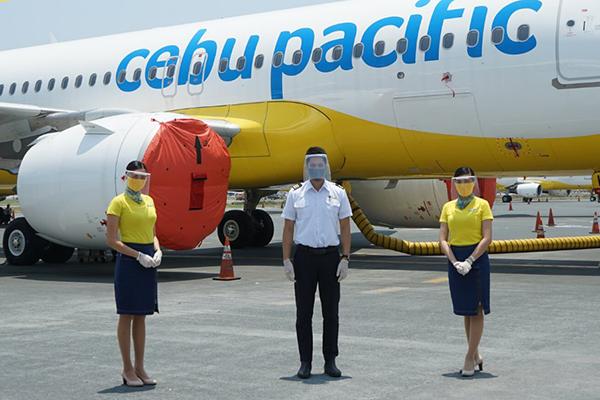
Despite an ongoing flight ban expected to last until the end of May, Filipino carriers Cebu Pacific and Philippines Airlines (PAL) have rolled out special measures as the industry returns to a “new normal.”
As the country gradually lifts restrictions, Cebu Pacific expects operations to normalize by year’s end.
The LCC has announced “contactless travel,” urging passengers to check in online on their devices and also to hold on to their boarding passes as a way to reduce lines at counters and minimize physical interaction.
However, the penetration of smartphones and reliable internet in the Philippines is relatively low, at 40% and 60% respectively. Cebu Pacific director of corporate communications Charo Logarta Lagamon told Aviation Daily that the number of passengers using online services is expected to grow and lines at kiosks and check-in counters in airports will fall accordingly.
Rival carrier PAL has introduced a free checked-baggage allowance of 5 kg as the cabin baggage allowance has been reduced to 2 kg. Meanwhile Cebu Pacific is limiting hand luggage to strictly one item per passenger that can weigh up to 7 kg and is not offering free checked-baggage. After all, baggage makes up the lion’s share of Cebu Pacific’s ancillary revenue. In 2019, ancillary revenue reached PHP17.4 billion ($341 million), about 20.5% of the airline’s total revenue of PHP85 billion.
Some in the industry have also called for alternate seating, although that is not set in stone for Cebu Pacific.
“We need to strike a balance between economic and financial viability of mounting flights, vis-à-vis the precautionary measures that need to be implemented, particularly physical distancing,” Lagamon said.
“In the first one to three months after we resume operations, we anticipate that passenger demand for travel and loads will be relatively weak,” she said.
“Hence, it is highly likely we will be able to space passengers in a flight. Whenever possible, we will keep middle seats vacant, and those that travel in groups like families and such can sit together.”
Seat selection is still available, although changing seats mid-flight is not allowed.
She said that fare hikes will be “benign” as it is imperative that the public regains confidence in flying again and are enticed to travel again.
“Over the near term, air travel will be limited to trips that are essential and urgent. We don’t see leisure travel coming back yet, particularly as quarantine and restrictions on tourism-related activities and businesses are still in place,” she added.
Forward bookings are still relatively weak. As of April 19, 14% of seats were sold for the next five months—a 50% drop from the 28% figure that stood in the same period last year. This figure still includes seats sold for flights on May 1-15, which were subsequently canceled in line with the extension of the quarantine measures, which are set to continue until May 31.
Cebu Pacific’s primary operations have revolved around passenger-cargo flights. Since the beginning of the national lockdown on March 16, the LCC has flown over 700 domestic and international all-cargo flights, carrying more than 5.5 million kilograms of cargo.





